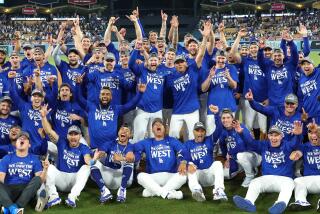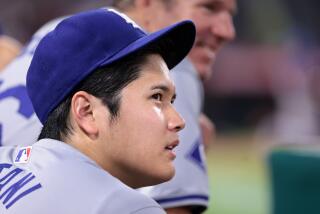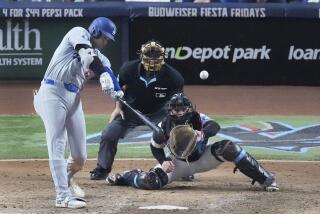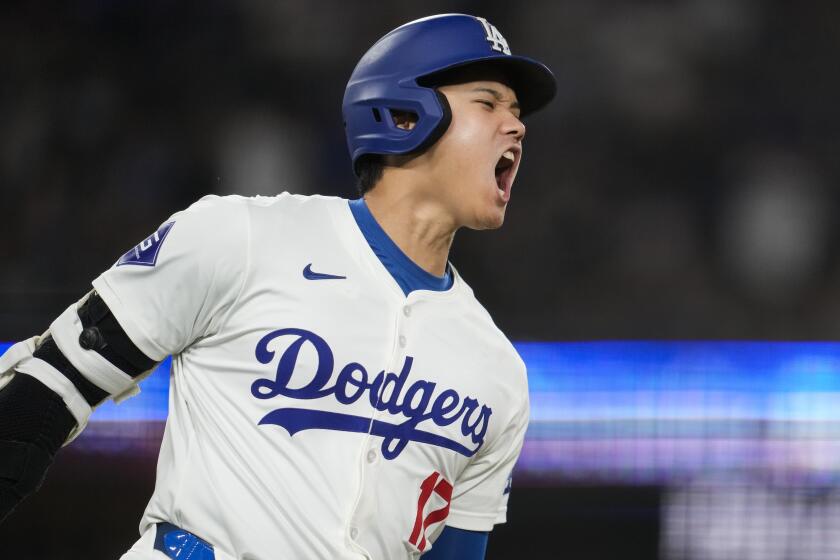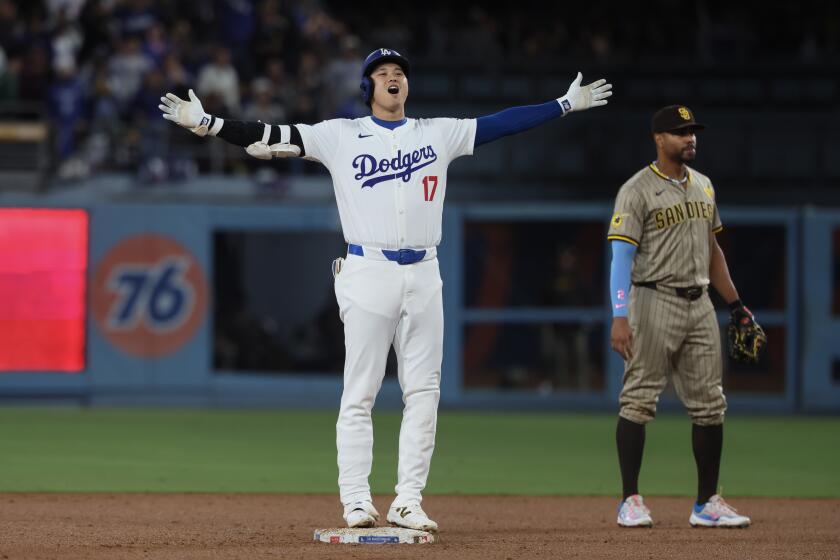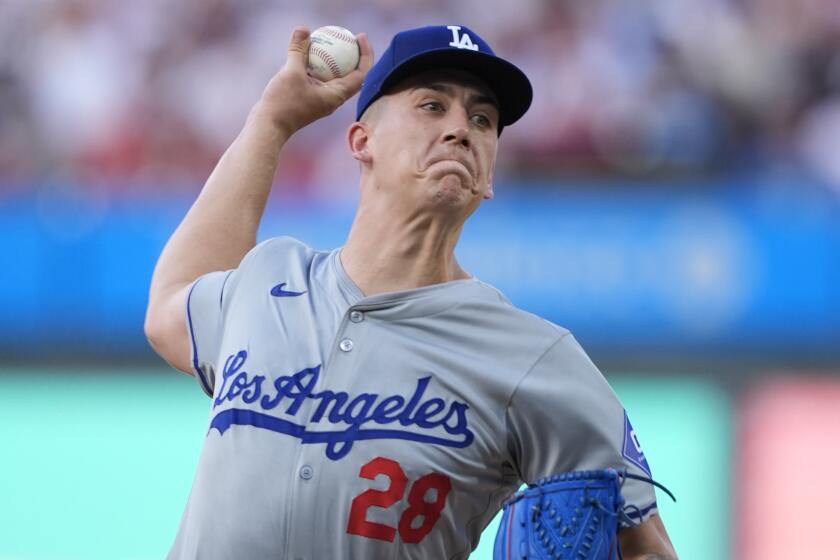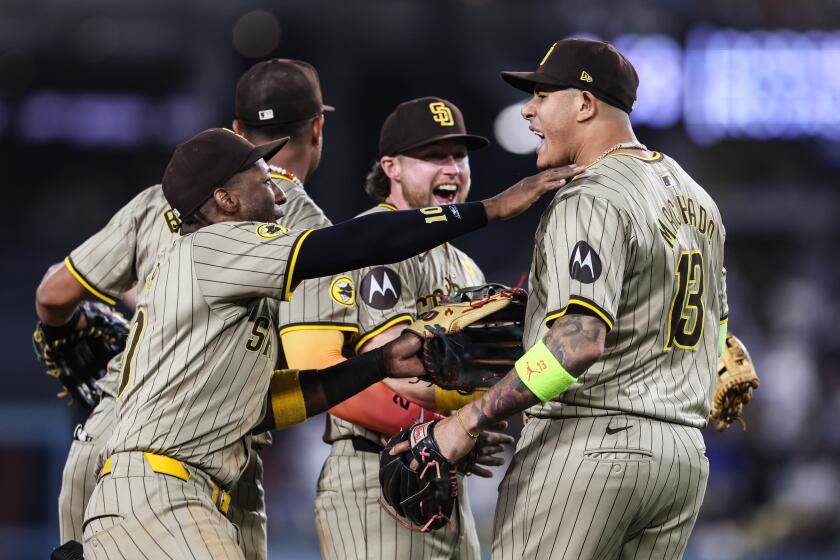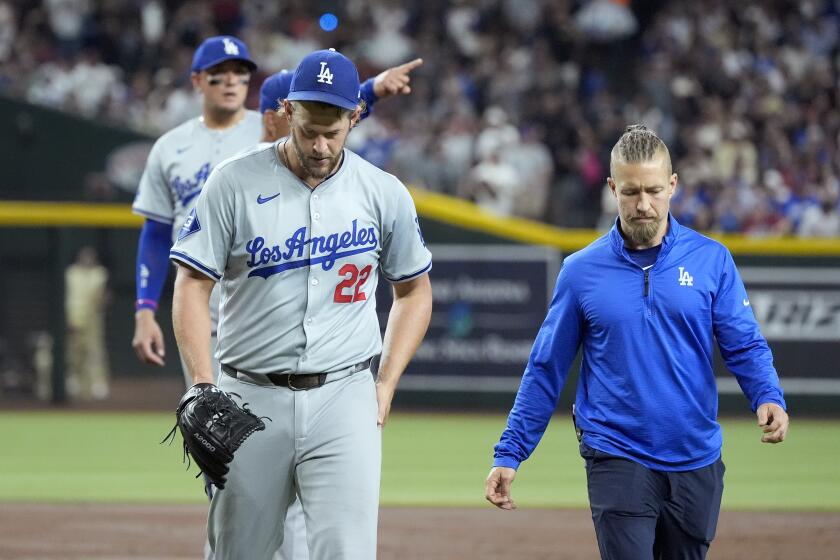Dodger Boss Is His Own Quiet Man
Bill Russell may not be Tom Lasorda’s first choice for manager, but the Dodgers have no complaints.
Russell, a strong, silent Midwestern type out of Pittsburg, Kan., has been asked to take over one of the most high-profile teams in sports in one of the most-high profile cities in the world and keep that team in contention, if not championship rings, for years to come.
That in itself is quite a task.
But Russell is also forced to follow not one, but two tough acts, two Hall of Fame managers, two men who led the Dodgers to unparalleled success for more than four decades.
First came the man who was like a dormant volcano. Strong, imposing, he could quickly become an active volcano if somebody missed a practice, a sign or a curfew. He was a country boy who never quite felt comfortable in the city.
His name was Walter Alston and he managed the Dodgers from 1954-76, winning seven pennants and four world championships.
They called him The Quiet Man.
Next came Lasorda, who was like an active volcano all the time, a fiery cheerleader who managed by inspiration and agitation. The show never stopped for Lasorda, whose office was part Hollywood sound stage and part Italian restaurant.
He managed from 1977 until the middle of the 1996 season, winning four pennants and two world championships.
Nobody ever called Lasorda The Quiet Man.
Now comes Russell, whose first manager was Lasorda when Russell was a 17-year-old outfielder playing for the Dodger farm team at Ogden, Utah.
Russell also played under Alston in his first eight seasons with the Dodgers.
When Russell took over the team in the middle of last season after a heart attack sidelined Lasorda, Russell knew right away that, while he was following Lasorda, he could never be Lasorda.
“My personality is not close to Tommy’s,” Russell said. “That’s just not me. I just can’t do that.”
His third base coach, Joe Amalfitano, who spent 14 seasons under Lasorda, agrees.
“[Russell] has a different style,” Amalfitano said. “He focuses only on the game between the lines.”
Russell knew that if he foolishly tried to emulate his predecessor his players would know he was a phony.
It’s a position Russell has been in before. As a player, he was part of the most durable infield in major-league history, one that was together a record eight years.
But while Steve Garvey, Davey Lopes and Ron Cey were constantly in the headlines, Russell quietly served as the reliable core of that infield, playing without much fanfare in 2,181 games, the most ever by a player in a Los Angeles Dodger uniform, and the second most in club history behind Zack Wheat, who played during the Brooklyn days.
When Russell took over, he brought with him a calm, businesslike mood. There would be few high and lows in the clubhouse. Those would be reserved for the field. Players would be treated as adults as long as they acted that way.
Every manager opens his regime with guidelines and players tend to yawn and go about testing the boundaries, like a toddler who is told he can’t sit on the living room furniture.
In the Dodgers’ case, it didn’t take long to find out that hands would be slapped when boundaries were crossed.
A few weeks after Russell took over, star outfielder Raul Mondesi showed up late for a game at Pittsburgh.
Although Mondesi is a key component of the club, Russell never hesitated, yanking him out of the lineup.
Eyebrows were raised. The message had been sent.
“If there had only been a couple of weeks to go in the season, I wouldn’t have done it,” Russell said. “But they made me manager and there are rules.”
Although some people never seem to learn.
This season, Russell twice has been challenged. And by young players. On separate occasions, pitchers Pedro Astacio and Ismael Valdes objected to being taken out of games and confronted Russell. He responded with a strong scolding, also shoving Astacio in the back in the dugout in full view of the television cameras.
To Dodger old-timers, it brought back memories of Alston once offering to fight any player who wanted to dispute his orders.
“If you are going to be in this position,” Russell said, “you’ve got to assert your authority.
“There was nothing personal there, but it has turned out to be a positive. The team has responded.”
Amalfitano was glad to see the outbursts by Russell.
“When people cross the line, he puts his foot down,” Amalfitano said. “He set them straight. When people challenged him, he had to send a message.”
Dodger executive vice president Fred Claire likes what he has seen.
“Billy is very direct, very up front with everybody,” Claire said. “It was also the approach he took as a player. He was very quiet, but if he had something to say, you heard it.
“There are strong similarities to Walt Alston in that Billy, too, is his own man.”
Dodger first baseman Eric Karros has been highly impressed with his new manager.
“For him to come in after Tommy,” Karros said, “for him to deal with that alone is a lot, let alone managing in the big leagues, let alone managing a team like this with high expectations, let alone his first job managing.
“He is following a Hall of Fame manager. He could have easily failed. But he didn’t. That’s why he’s special.”
Karros concedes it is now a different Dodger clubhouse than it was under Lasorda. There are certainly not the constant pep talks there were under Russell’s predecessor.
“I don’t think you need to be motivated at this level,” Karros said. “It’s not as boisterous, not as loud in this clubhouse, but I don’t think you can say one way is better than the other.”
Russell said he never planned to become a manager. When Russell’s career finally ended after the 1986 season, Lasorda offered him a job as one of his coaches. He took it.
When the managerial job with the Dodgers’ triple-A team at Albuquerque opened up two years later, Russell was offered that position. This time, he declined.
“I wasn’t ready,” he said, showing he knows his own limits as well as those he sets for others.
When the job was available again in 1992, Russell, then 43, felt he was finally prepared and accepted.
In two years there, Russell got a quick course in crisis management. Because of constant call-ups from the big club and nagging injuries, he was forced to use 89 players, some of them, such as Mondesi, Astacio and Mike Piazza, players whose development at the triple-A level later would help Russell at the major-league level.
When Russell determined that he wanted to be a big-league manager, he wasn’t necessarily going to wait for Lasorda to retire. He interviewed for the Chicago White Sox job, but didn’t get it.
But now he is the Dodger boss. Even down to his office.
Under Lasorda, the room was filled end to end with photos of celebrities.
Russell took all that down.
Now there is a picture of only one celebrity in Russell’s office--John Wayne.
(BEGIN TEXT OF INFOBOX / INFOGRAPHIC)
Dodgers on the Upswing
Number of games the Dodgers are ahead of last season’s pace (through 113 games):
*--*
YEAR (Place) W L GB 1997 (2nd) 61 52 -- 1996 (2nd) 59 54 2
*--*
More to Read
Are you a true-blue fan?
Get our Dodgers Dugout newsletter for insights, news and much more.
You may occasionally receive promotional content from the Los Angeles Times.
